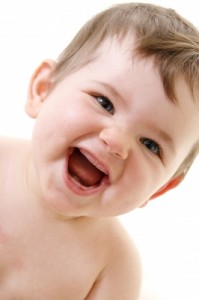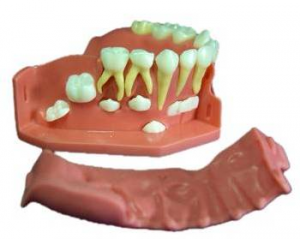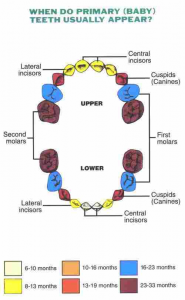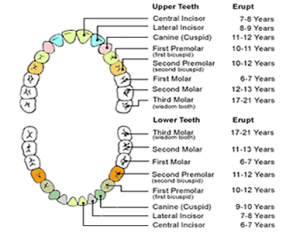 The ideal time for a child’s first dental exam is about the age of one year old. Dental problems may start early, like baby bottle tooth decay, teething irritations or gum disease, the sooner the visit the better.
The ideal time for a child’s first dental exam is about the age of one year old. Dental problems may start early, like baby bottle tooth decay, teething irritations or gum disease, the sooner the visit the better.
It is important to treat baby teeth. Broken down teeth may cause pain to your child and affect his eating or even prevent him from sleeping. The baby teeth are in close relationship with the adult teeth as shown in the model below. A problem in a baby tooth may affect or prevent the development of the adult tooth and have a life long impact on your child’s dentition. Since baby teeth function to maintain a space for the adult teeth, as seen in the model. If the tooth is lost due to decay, the space is lost and this may be fixed with an orthodontic treatment. 
We recommend to give the child a tooth brush close to the age of 6 months so he can start playing with it. At that time he might be having discomfort from the erupting teeth, playing with the brush may help. At this stage no tooth paste is needed .
Once the teeth have erupted the child may start using a children’s tooth paste with a reduced fluoride content. The child might find that some paste is tastier than the others in case he dislikes the tooth paste.
One of the most common questions parents have is about the timing and sequence of teeth eruption and replacement. Usually the first teeth start erupting at the age of 6 months. These are the lower first incisors. Following them, the upper first incisors will erupt and then the second incisors on the sides of the first ones, canines ( eye teeth) and last the first and second molars. When all the teeth are through, there should be 20 in total. Below is a schematic chart showing the range of eruption times. Sometimes the first teeth may erupt earlier than 6 months or there can be differences in the order. A large deviation from the below mentioned times should be examined. Contact us to make an appointment.
 The adult teeth start erupting and replacing the baby teeth at the age of 6 years. The adult teeth will keep erupting and replacing the baby teeth till about the age of 12 years.
The adult teeth start erupting and replacing the baby teeth at the age of 6 years. The adult teeth will keep erupting and replacing the baby teeth till about the age of 12 years.
The time frames mentioned are an average. Possible reasons for changes in the eruption could be due to missing teeth. The most common missing teeth are the upper lateral incisors. Another cause could be additional teeth which impede the eruption, reattained or ankylotic teeth. An early detection of eruption problems may enable us to provide treatment and prevent more elaborate treatment in the future. If the eruption of your child’s teeth deviates substantially from the average times it is good to make an appointment to see if there are no problems or interferences with the eruption or replacement.
Please contact the practice if you have any concerns about your child’s teeth, their position or their eruption.